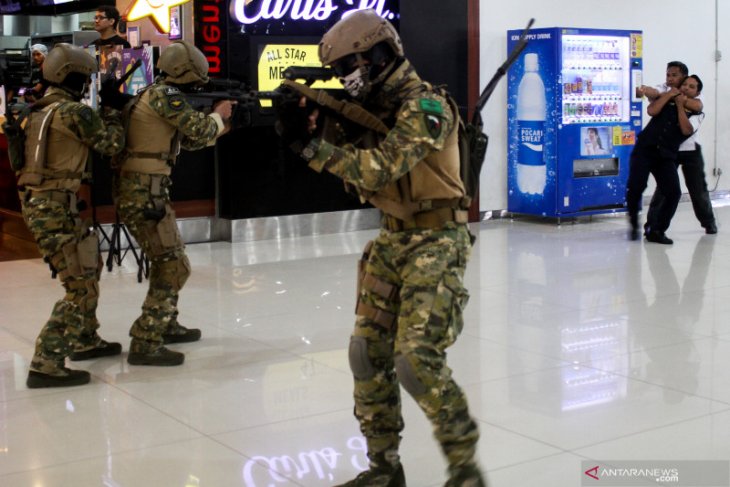Live Streaming
Program Highlight
Company Profile
TNI's Involvement in Fighting Terrorism will Have Deterrent Effect
Written by Ani Hasanah
A counterterrorism drill was conducted by several Indonesian navy personnel at East Java's Juanda International Airport Terminal 2 last year. ANTARA FOTO/Umarul Faruq
The Indonesian presidential regulation on engaging the Indonesian Military (TNI) in countering terrorism will deter any terrorist group in the country from continuing its movements, a University of Indonesia's (UI's) terrorism expert stated.
"The draft of the presidential regulation as a follow up to Law Number 5 of 2018 on Countering Terrorism will deter terrorist groups. If the TNI gets involved, there will likely be a shock factor and fear," Ridlwan Habib told journalists in Jakarta, Tuesday.
The presidential regulation, to shortly be issued by President Joko Widodo, encompasses comprehensive information on the TNI's involvement in cracking down on terrorism since the nascent stages of preventing to countering and recovering, he remarked.
Habib opined that involving the TNI in measures to fight terrorism was the pertinent decision since its intelligence capabilities would help to effectively prevent the occurrence of terror acts.
The TNI has had capable intelligence units, right from headquarters to territorial units. Consequently, its intelligence data can be applied to deter the terrorist groups from conducting their planned acts of terror, he remarked.
"The fear and shock among members of a radical group over TNI’s involvement in counterterrorism measures can be traced back to several groups of social media platforms. This radical group is apprehensive about the outreach of the TNI networks up to villages," he pointed out.
Referring to the draft of the presidential regulation, its Article 9, for instance, highlights several terror acts that the TNI can counter, including assaults targeting the president and vice president, Indonesia's vital objects, and highly-scaled acts of terror.
"The TNI has the 81 Special Detachment (Gultor) of the Army's Special Force (Kopassus) and also the special operation command at the TNI headquarters that can be dispatched at any time," Habib noted.
The presidential regulation does not violate the norms of Indonesia's legal system as stipulated in Article 10 that mentions individuals caught by the TNI units would soon be handed over to the Indonesian police for further legal proceedings.
Habib also put to rest concerns rising of the presidential regulation paving the way for human rights violations since the TNI personnel had actually joined counterterrorism missions along with the police, akin to the Tinombala Operation.
In 2016, the Indonesian military and police had launched a manhunt, through the Tinombala Operation 2016, to hunt down Santoso, also known as Abu Wardah, a top leader of the Poso-based terrorist group, and his men in the jungles of Poso, Central Sulawesi Province.
Owing to the presidential regulation drafted with seven chapters and 15 articles, the TNI’s involvement in Indonesia's crackdown on terrorism was more measurable and monitored, he stated.
Indonesia has become the target of attacks by terrorists since 2000, and the spread of radicalism and terrorism continues to threaten the country.
Antara noted that in May 2018, a church in the East Java city of Surabaya was attacked. Three years back, ISIS supporters in Indonesia had launched a suicide bombing and shooting attack in Jakarta on Jan 14, 2016, resulting in the deaths of eight people, including three innocent civilians.
The incident added to the list of deadly assaults conducted by terrorist cells in Indonesia. From 2000 to 2012, over a dozen attacks took place in the capital city, including the Australian embassy bombing on Sept 9, 2004, and the JW Marriott and Ritz-Carlton hotel bombings on July 17, 2009.
One of the most effective ways of freeing Indonesia from the vicious circle of radicalism and terrorism is by empowering women in the country, as they can actively contribute to rescuing Indonesian children from being misled by terrorist recruiters. (ANTARA)



